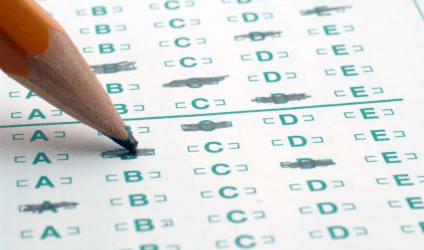 What Is a Good ACT Score?" width="424" height="250" />
What Is a Good ACT Score?" width="424" height="250" />Wondering what to expect on the ACT? Read on to learn how to prepare for the ACT and what to bring to the ACT test center.
Staff Writers Staff Writers Read Full BioThe staff writers for BestColleges collaborate to deliver unique, student-driven content on topics such as career development, college life, and college planning.
Updated on August 15, 2022 Tyler Epps Tyler Epps Read Full BioTyler Epps is an editor for BestColleges. He writes and edits content about higher education, specializing in degree planning and college rankings. He is passionate about helping students prepare for college and navigate their educational journey. He.
Learn more about our editorial process Staff Writers Staff Writers Read Full BioThe staff writers for BestColleges collaborate to deliver unique, student-driven content on topics such as career development, college life, and college planning.
Tyler Epps Tyler Epps Read Full BioTyler Epps is an editor for BestColleges. He writes and edits content about higher education, specializing in degree planning and college rankings. He is passionate about helping students prepare for college and navigate their educational journey. He.
Updated on August 15, 2022 Learn more about our editorial processwww.bestcolleges.com is an advertising-supported site. Featured or trusted partner programs and all school search, finder, or match results are for schools that compensate us. This compensation does not influence our school rankings, resource guides, or other editorially-independent information published on this site.
Turn Your Dreams Into Reality
Take our quiz and we'll do the homework for you! Compare your school matches and apply to your top choice today.
Nearly 1.3 million students took the ACT in 2021, as compared to nearly 1.7 million the prior year. While some colleges and universities now make the ACT and SAT voluntary for incoming undergraduates, many still require applicants to submit scores.
You can find plenty of information on study schedules, but it's important to think about the hours leading up to test time as well. Here, you can find actionable advice on how to feel prepared for ACT test day.
On ACT test day, be prepared for the exam to start around 8:30 a.m. Because of this, examinees should plan to arrive no later than 8:00 a.m. so they can store personal belongings and find their seats.
If taking the traditional ACT, the exam lasts for three hours. Students who take the Writing portion as well should plan to spend 3.5 hours on the exam.
Prepared students know to bring several items with them on ACT test day, both to help confirm their identity and provide support during the exam. We look at some must-bring items below.
Check Circle Check Circle Check Circle Check Circle Check Circle Check Circle Check Circle Check CircleFollowing the tips and tricks outlined below for the night before can help test-takers feel confident walking into the ACT testing center.
Trying to cram for the ACT the night before can actually produce negative effects when test day arrives. In fact, studying the night before is typically frowned upon as you should use the time to rest and relax.
Because the ACT starts early in the morning and you may feel anxious, try to gather all your personal belongings and ACT materials the night before. Whether you decide to place them in your bag or make a pile you can double-check in the morning, gathering items the night before can help ease your anxiety.
While you would likely receive an email or other type of notification if something changed, it's always a good idea to check your test center's location and website to make sure there are no last-minute closings or exam delays.
Rest plays a critical role in memory and recall, making sleep one of the most important things you can do the night before the big test. You don't want to go to bed too early, but try to fall asleep at your normal time and get at least eight hours of sleep.
While there's plenty you can do the night before exam day, there are also steps to take to arrive at the testing center feeling refreshed, prepared, and calm.
Eating a nutritious breakfast before heading to the exam center ensures your brain and body have the energy needed to carry you through hours of test-taking. Some options include oatmeal, yogurt and berries, eggs and whole-wheat toast, or a breakfast sandwich.
Changing up your normal morning routine can leave you feeling out of sorts and unfocused. Instead, stick with your typical patterns and behaviors. That said, if you usually drink a few cups of coffee each morning, you may want to limit how much caffeine you drink to avoid the jitters.
Since you'll be sitting in a chair for 3-3.5 hours with only one break in the middle, wearing comfortable clothes can help you feel more relaxed and at ease. Because you won't know the exam room's temperature until arriving, it's also a good idea to bring a jacket.
Students who want to ease testing nerves should leave their homes with plenty of time to get to the testing center early. Leaving early can allow extra time to get through morning traffic and find the test center location. Arriving early also lets you check in, store personal belongings, and settle in before the exam begins.
ACT's official website provides a list of prohibited items, and smartwatches — including Apple Watches — are on this list. Smartwatches are considered a type of electronic device with access to services that could allow for cheating during the exam. Students cannot use their smartwatches or smartphones during the exam or during their breaks.
Students caught wearing a smartwatch may be asked to leave or have their item confiscated. The website also lists other types of wearable devices that are not allowed in the exam room, including fitness bands such as Fitbits and Garmins.
Phones fall under the same category as smartwatches since they can be used as recording devices. They can also allow students to look things up on the internet and ask others for answers.
If brought into the testing center, smartphones must be placed in your bag and secured in a locker for the duration of the exam — including during the break. Students who are caught using their phones during the exam or during breaktime can have their devices taken away and their scores invalidated.
In addition to technology, students should carefully review the full list of prohibited items before heading to their testing center. For instance, students cannot bring textbooks, dictionaries, notebooks, loose pieces of paper, or other types of aids.
In addition, test-takers cannot bring any pens, highlighters, or unapproved pencils into the testing room. Tobacco in any form (including vapes) is prohibited, as are any types of reading materials. The only type of electronic device on the list of permitted items is an approved calculator.
 What Is a Good ACT Score?" width="424" height="250" />
What Is a Good ACT Score?" width="424" height="250" />


BestColleges.com is an advertising-supported site. Featured or trusted partner programs and all school search, finder, or match results are for schools that compensate us. This compensation does not influence our school rankings, resource guides, or other editorially-independent information published on this site.
Compare Your School Options
View the most relevant schools for your interests and compare them by tuition, programs, acceptance rate, and other factors important to finding your college home.